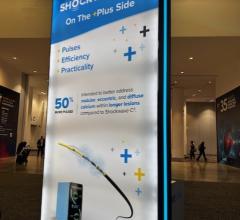
October 20, 2015 — Results from the BRAVO 3 trial found that bivalirudin did not significantly reduce major bleeding rates at 48 hours or adverse events at 30 days compared to heparin in high-risk patients undergoing transcatheter aortic valve replacement (TAVR).
Findings from the BRAVO 3 study were presented at the 27th annual Transcatheter Cardiovascular Therapeutics (TCT) scientific symposium, sponsored by the Cardiovascular Research Foundation (CRF). Study results were also published in the Journal of the American College of Cardiology.
Anticoagulation is required during TAVR procedures, and major bleeding remains an important concern. In daily practice, unfractionated heparin has been the empiric procedural anticoagulation regimen for TAVR. While protamine can be used to reverse the anticoagulant effect of heparin, practice patterns vary, with guideline statements based on expert consensus rather than on evidence from randomized trials. Bivalirudin is a reversible direct thrombin inhibitor with a half-life of 25 minutes, and has reduced major bleeding in the setting of percutaneous coronary intervention compared to other regimens.
The Phase IIIb open label, randomized study enrolled 802 patients (18 years of age and older) from 31 sites in seven countries with aortic stenosis who were at a high surgical risk (Euroscore ≥18 or considered inoperable) and scheduled for TAVR via transfermoral access. Subjects were randomized in a 1:1 ratio to receive bivalirudin (N=404) or unfractionated heparin (N=398). The 30 day follow-up rate was 97.5 percent for patients in the bivalirudin group (N=394) and 97.5 percent for the heparin group (N=388).
Anticoagulation with bivalirudin versus heparin was associated with a non-significantly different rate of major bleeding at 48 hours (6.9 percent vs. 9 percent, relative risk 0.77, 95 percent confidence interval [CI] 0.48–1.23; p=0.27). The rates of net adverse cardiovascular events at 30 days were also similar (14.4 percent vs. 16.1 percent, relative risk 0.89, 95 percent CI 0.64–1.24 risk difference, –1.72, 95 percent CI –6.70, 3.25; p=0.50). Regarding the latter, the prespecified non-inferiority hypothesis was met (pnon-inferiority<0.01). Rates of bleeding events or major adverse cardiovascular events after 48 hours were not significantly different.
“In patients undergoing transfemoral TAVR with severe symptomatic aortic stenosis, procedural anticoagulation with bivalirudin did not significantly reduce the primary outcomes of major bleeding at 48 hours or net adverse cardiac events at 30 days compared with heparin,” said lead investigator Thierry Lefevre, M.D., an interventional cardiologist from Institut Hospitalier Jacques Cartier, Massy, France.
“Despite not achieving superiority, non-inferiority was met and no safety concern was identified. Given the lower cost, heparin should remain the standard of care, and bivalirudin can be an alternative anticoagulant in patients not able to receive heparin.”
The BRAVO 3 trial was funded by The Medicines Company to Mount Sinai. Lefevre reported receiving consulting fees/honoraria from Boston Science, Directflow, Edwards, Symetis and Medtronic.
For more information: www.tctconference.com


 October 31, 2025
October 31, 2025 









